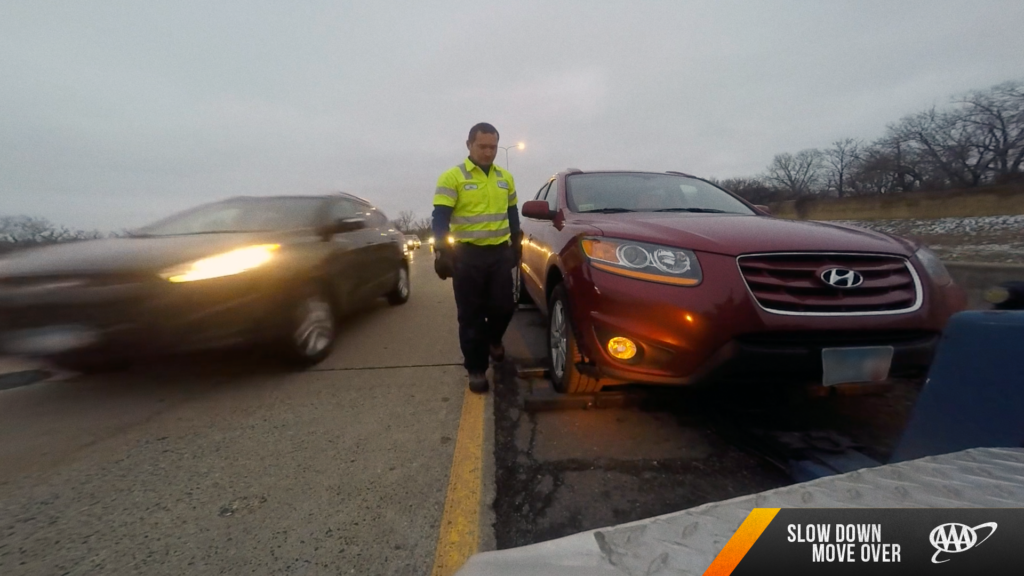
ORLANDO, Fla. (Sep. 29, 2021) – The recent deaths of two AAA tow providers, killed while assisting motorists, highlight just how dangerous it is for individuals who regularly work along the shoulders of America’s busy and congested roads.
Glenn Ewing, 32, was killed July 4 near Cincinnati, OH, while placing a disabled vehicle on the back of a flatbed on the side of the road. He leaves behind a fiancée and two children. Only three weeks later, 30-year-old David Meyer was assisting a driver on the left-hand shoulder in Castle Rock, CO, when he was also struck and killed. As of August of this year, 14 tow providers have been killed while helping others at the roadside in 2021.
“Deaths like these can be avoided if drivers slow down and move over to give these people room to work safely,” said Marshall Doney, AAA President and CEO. “We can’t stress enough how important it is to pay attention so you have time to change lanes when you see AAA, an emergency responder, or simply anybody along the side of the road.”
Startling new data from the AAA Foundation for Traffic Safety finds that among drivers who do not comply with Move Over laws at all times:
- 42% thought this behavior was somewhat or not dangerous at all to roadside emergency workers. This demonstrates that drivers may not realize how risky it is for those working or stranded along highways and roads close to moving traffic.
An average of 24 emergency responders including tow providers are struck and killed by vehicles while working at the roadside each year – meaning someone in this line of work is killed, on average, every other week.
To protect these individuals, AAA and other traffic safety advocates have led the way in getting Move Over laws passed in all 50 states and the District of Columbia. Yet, the AAA Foundation finds that –
- nearly a quarter of those surveyed (23%) are unaware of the Move Over law in the state where they live, and
- among those who are aware of their state’s Move Over laws, about 15% report not understanding the potential consequences for violating the Move Over law at all.
In Colorado, for instance, drivers face a $70 ticket, four penalty points, and a misdemeanor charge for failure to move over or slow down when approaching an emergency vehicle, tow truck, utility vehicle, or road maintenance vehicle with flashing lights on the side of the road. Ohio’s Move Over law requires all drivers to proceed with caution and if possible move over one lane when passing an emergency vehicle, tow truck, municipal vehicle, or road maintenance vehicle with flashing or rotating lights parked on the roadside, and violators can face fines up to $300 for a first offense.
It’s not just tow providers and other emergency responders being killed on the side of the road. Since 2015, over 1,600 people have been struck and killed while outside of a disabled vehicle. The reality is that drivers are increasingly distracted while driving. Previous AAA Foundation research has found that drivers are up to four times as likely to crash if they are talking on a cell phone while driving and up to eight times as likely to be in a crash if texting.
“If you see something, anything, on the shoulder ahead, slow down and move over,” said Jake Nelson, AAA’s director of traffic safety advocacy and research. “It could literally save someone’s life.”
About Slow Down, Move Over
Since 2007, AAA has been instrumental in passing Move Over laws in all states, including advocating for those laws to cover tow providers and other emergency responders. Additionally, AAA clubs have participated in educational and advocacy initiatives, creating public service announcements and reaching out to state officials. But, there is more work to be done. AAA is committed to raising awareness of the Move Over laws and the dangers associated with working at the roadside.
These laws require motorists to move over one lane or slow down when approaching an incident where tow providers, police, firefighters or emergency medical service crews are working at the roadside. Many states have also expanded their laws to cover other vehicles, such as utility and municipal (e.g. sanitation vehicles) fleets, as well as any disabled vehicle on the side of the road.
To protect roadside workers, drivers with disabled vehicles, and others, and to improve highway safety, AAA offers these precautionary tips:
- Remain alert, avoid distractions and focus on the task of driving.
- Keep an eye out for situations where emergency vehicles, tow trucks, utility service vehicles or disabled vehicles are stopped on the side of the road.
- When you see these situations, slow down and if possible move one lane over and away from the people and vehicles stopped at the side of the road.
Last year NHTSA and DOT committed to protecting first responders at the roadside and it’s important we all do our part to further this effort.
About the AAA Foundation for Traffic Safety: Established in 1947 by AAA, the AAA Foundation for Traffic Safety is a nonprofit, publicly funded, 501(c)(3) charitable research and educational organization. The AAA Foundation’s mission is to prevent traffic deaths and injuries by researching their causes and by educating the public about strategies to prevent crashes and reduce injuries when they do occur. This research develops educational materials for drivers, pedestrians, bicyclists, and other road users.
About AAA: AAA provides more than 62 million members with automotive, travel, insurance, and financial services through its federation of 30 motor clubs and more than 1,000 branch offices across North America. Since 1902, the not-for-profit, fully tax-paying AAA has been a leader and advocate for safe mobility. Drivers can request roadside assistance, identify nearby gas prices, locate discounts, book a hotel or map a route via the AAA Mobile app. To join, visit AAA.com.
